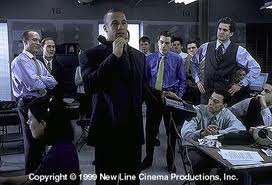Why You Need To Demand A CRM
One of my first jobs out of college was a staffing and recruiting agent for Java developers. The office was in the heart of the city, but it was tiny, cramped and looked like a scene from the movie Boiler Room. No computers, no cubes, no pretty walls; just concrete, carpet and long tables packed with employees in a seat with a phone either pressed against their ear or pinched between their neck and shoulder. There was no care or model for tracking our contacts or our conversations. We had a lengthy printed list that we pounded through and we took hand-written notes when necessary. This was not the 80’s, or even the 90’s for that matter. This was 2006.
I wonder if that company can still be in business? How are they tracking existing clients and ensuring client retention or repeat business? Who’s in their pipeline or who’s been disqualified and what were the reasons for it? How is it being communicated across the business? Which prospects need to be followed up on in 3 weeks? In 4 weeks? The brain is a powerful force but with so many outside distractions, do we really want to rely on our memory and post-it notes?
The incredible rise of technology and social media has resulted in big data getting even bigger. So it’s crucial to be able to make sense of the data that matters to your daily business responsibilities – doesn’t matter if it’s Sales, Marketing or Customer Service – we rely on good, accurate information so we can make the best possible decisions to make us and our team successful.
I used a CRM in a business development role and now as a manager of Client Operations. Our CRM is one stop shop for what I need on a daily basis. I run analytics and reports for my clients and track my teams’ performance based on outbound dials/emails, interested pipeline and passed opportunities. We use the social application of the CRM to communicate our achievements, milestones and process improvements throughout the company. At a bird’s eye view, it keeps our entire organization organized and on pace with the daily tasks that need to be completed.
I cannot imagine a business, especially one so focused on sales, operating without one. You don’t have to be a Fortune 500 company to warrant the need for this either. My company has less than 60 employees and I’m not so sure we’d survive without our CRM.
Yes, it’s not free. It’s an investment that even small businesses need to look into, no matter if you’re a startup or an established family business since the days of the Titantic. When making an investment it’s most important to maximize that money spent. What’s that mean? It means learn the CRM inside and outside – make it your best non-human friend. It will work for you; it will increase your profit margins and will increase your client retention rates.